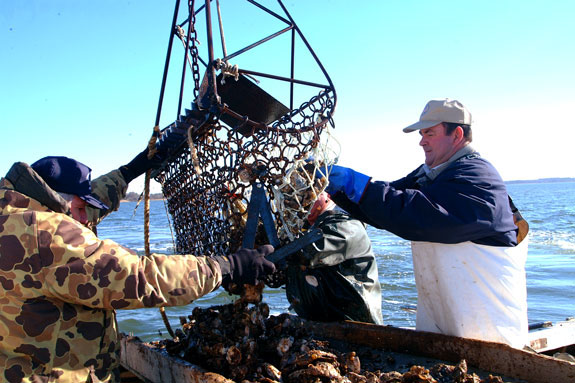We are supporting research that will determine the current state of acidification in Chesapeake Bay waters and identify areas in the bay that are most and least prone to acidification impacts. This has implications for oyster restoration efforts in Chesapeake Bay and future shellfish management and restoration plans.
Why We Care
In the Chesapeake Bay, oysters have a long history and cultural significance. They provide livelihood for shellfish harvesters, as well as filtering the water and providing habitat for other estuarine species. However, changes in the bay’s chemistry due to increasing carbon dioxide and subsequent increasing acid levels in coastal waters may have negative impacts to this iconic species. While oyster restoration efforts are underway, it is unknown what kind of acidification conditions these oysters will face, as no comprehensive survey or predictions exist for Chesapeake Bay. Additionally, over-enrichment of nutrients in the bay can lead to low oxygen (hypoxia) and further acidification.
What We Are Doing
We have funded a project team including the University of Maryland, the University of Delaware, and the University of Washington who will:
- Take field measurements to make the first comprehensive study of the spatial and temporal variability in the carbonate system in Chesapeake Bay,
- Conduct experiments to quantify both carbonate and nutrient exchange between intact oyster reefs and the surrounding water while measuring response of these fluxes to reef structure and acidification, and
- Advance numerical modeling tools to concurrently simulate the dynamics of nutrient enrichment, hypoxia, acidification, and oyster reef growth and interaction with the water-column under present and future conditions.
Benefits of Our Work
This project will
- Delineate the drivers of Chesapeake Bay acidification and improve our understanding of estuarine chemistry,
- Develop a spatially explicit framework to identify shellfish restoration areas most and least prone to acidification impacts, and
- Better understand feedbacks associated with future environmental conditions and shellfish restoration goals estuary-wide and within a model tributary.
This project has an advisory group that includes Chesapeake Bay water quality managers and representatives from the shellfish industry.

